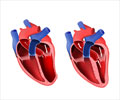
‘Repairing heart muscle damaged by a heart attack or other cardiovascular diseases is one of the "holy grails" for cardiovascular scientists. ’
Tweet it Now
By taking a tiny bit of blood, scientists can generate an individual's patient specific stem cells and then convert them into any cell type in the body -- including cardiomyocytes, the cells that make up the heart muscle. The research, however, is in its infancy and the technique is not yet ready to be deployed for human heart disease regenerative purposes. In a study published this month in Nature Communications, Jared Churko, PhD, assistant professor of Cellular and Molecular Medicine at the UA College of Medicine - Tucson, used a systems-based approach encompassing single-cell transcriptomics, single-cell proteomics and CRISPR gene-editing to identify different subpopulations of cardiomyocytes.
Definitions:
Transcriptomics is the study of the transcriptome - quantification of the types of RNA produced within the cell.
Proteomics is the study of proteomes, the proteins expressed by a cell, tissue or organism.
Advertisement
The research reveals multiple subpopulations of cardiomyocytes expressing specific transcription factors (NR2F2, TBX5 and HEY2) -- with different spatial and biological functions as observed in the heart. Dr. Churko believes this new understanding of cardiomyocytes can be used to better repair heart muscle injuries in the future.
Advertisement
Dr. Churko's research team included scientists from Stanford University and the Cincinnati Children's Hospital Medical Center. Dr. Churko is associated with the Center for Innovation in Brain Science, an assistant professor of physiological sciences and genetics in the Graduate Interdisciplinary Programs, member of the Center for Applied Genetics and Genomic Medicine and the UA BIO5 Institute and director of the UA iPSC Core in the UA Sarver Heart Center.
Source-Eurekalert















